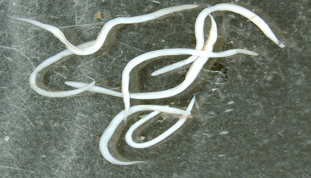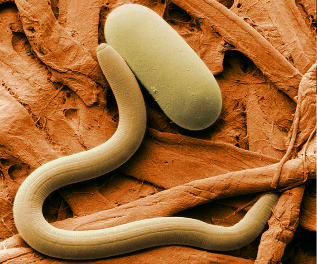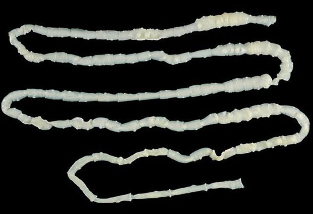Despite the achievements of modern civilization in General and medicine in particular, the question is, what are the different types of worms and how they affect the human body, continues to be relevant. There are several types of worms that can be seen in the photo with description. Different worms may not provide the same degree of risk to humans, but in any case, strike the immune system and can cause the development of other ailments.
In the human body parasites 2 types of worms: round (nematodes) and flat (tapeworms and flukes).

Roundworms
One of the main features of nematodes is their extraordinary endurance. They can survive even after 5 years in formalin. Among other features of roundworms should be identified:
- the rapid development of primitive life cycle;
- simple digestive system, consisting of a straight tube from the mouth to the anus;
- fast reproduction;
- movement, intense movement of the organs of the host.
The most common and dangerous types of roundworms include: pinworms, ascarids, vlasoglavy, Trichinella, Giardia.
Pinworms
Pinworms – the worms are usually white in color. Males are very tiny, no more than 5 mm, while the length of Mature females is greater than 1, see photo pinworms resemble sticks with sharp ends. The symptoms appear after 5-6 hours after their ingestion. Female lays eggs in the folds of the anus, after which the newly hatched worm sneaks up the gut.
If pinworms struck the body gives the following signs – itching in the anus, intestinal disorders, irritability, nausea. Usually this type of worms affects small children who tend to put things in their mouth and not enough personal hygiene.
Roundworm
Unlike the pinworm roundworm have large dimensions from 15 to 40 cm Eggs larvae enter the digestive system, where they continue to parasitize before the final maturity. Roundworm live for about a year. When infected person suffers from abdominal pain, nausea, vomiting, fatigue, allergic reactions.
Important! Every patient can be an individual reaction to an infection by this type of worms. The severity of symptoms can vary from minor ailments to serious manifestations.
Whipworm
The name of the worm is received due to the thin and long-shaped body of hair. Most often lives in the caecum. Length of the parasite from 5.5 mm (females) to 4.5 cm (males). Its sharp front end of the whipworm pierces the mucous membrane of the intestines, therefore eating the blood and tissue fluid. Whipworm has symptoms that are similar to the manifestations of the activities of other parasites.
Among the specific symptoms are:
- sensations similar to appendicitis;
- the development of polyps and cysts in the habitat of the parasite;
- ulcer of the stomach;
- seizures.

The species Trichinella
Treat roundworms, which are parasitic to organisms of many species both domestic and wild animals (badgers, wild boars). The main route of infection – ingestion of raw meat or products from infected meat, cooked rare.
Just a few days you will need the larva of Trichinella to full maturation in the duodenum. Good mobility allows the parasite to penetrate into various organs along with the blood. In severe cases of trichinosis gives a complication in the respiratory tract, the Central nervous and cardiovascular system. If untreated, the infection can even lead to death.
Giardia
The size of these malicious worms are so small that to consider them only under the microscope. However, the damage to the body, especially for children, they do great. With the help of flagella on the body of the parasite attaches itself to the mucous membrane of the intestine, taking away all the nutrients.
Giardia is very viable and can be active at any time of the year. They can be:
- in untreated raw water;
- dirty hands, unwashed vegetables, fruits;
- in the ground, the sand;
- on toys, dishes, household items.
One of the specific signs of giardiasis is a pink-red rash on the skin accompanied by itching, and severe prolonged diarrhea with fetid odor.
Flat worms
This type of worm has a tapered body in the form of sheet or tape. In contrast to the round, flat worms have characteristics of both male and female. Of all the vital systems of these worms should be allocated to the digestive and excretory. The human parasites include flukes and tapeworms. In humans flatworms are fixed to the walls of organs or vessels using suction cups.
Hepatic Dens
The parasite is flat in shape, reaching 5 cm in length. It got its name due to the common localization in the liver. May also inhabit the gall bladder and the pancreas thanks to its two suckers: oral and ventral. At the beginning of the development cycle of the helminth faeces, infected him with eggs, penetrate the soil and water. Then through an intermediate host, the mollusk, the eggs are transferred to the body of the fish, where the hatching larvae are fixed in their body. The consumption of contaminated fish causes a dangerous disease opisthorchiasis.
To get infected with such kind of worms can by eating insufficiently cooked meat of bream, carp, roach, gudgeon, crucian carp and other fish. Among the symptoms there are:
- the increase in body temperature;
- pain in the muscles;
- biliary colic;
- acute pain in the right side;
- and loss of appetite.
Important! Damage diagnosis of the Fluke is often complicated. In the transition of opisthorchiasis in the chronic form the symptoms resemble diseases such as gastritis and pancreatitis.

Bovine and pork tapeworm
These two kinds of parasitic tapeworms have different intermediate hosts, but the permanent place of residence of both is people. Beef tapeworm is the largest of all intruders of the human body. Its length is 10 m.
Pork tapeworm easier to expel from the body, but it is very dangerous because it can migrate not only in the intestine but also in brain, liver and even the eyes of man. Initially, the disease is almost asymptomatic, but later manifests itself:
- weakness, insomnia, headache;
- heartburn, nausea;
- pain in the stomach;
- exit with feces of the bovine tapeworm segments;
- sudden changes: from hunger to increased appetite;
- anemia.
Echinococcus
This species of worms live in dogs, foxes, wolves, and occasionally cats. The appearance and method of fastening it in the body of living beings are the same as in other species of flatworms. Among people at risk include those who work with animals (hunters, shepherds). The symptoms of echinococcosis are reminiscent of liver disease. In addition of stool disorders and General malaise common symptom is icteric staining of the skin.
Treatment
Despite the heavy flow of diseases caused by helminths, there are many effective medications that relieve the human body from all types of worms. The main feature of pills for worms is their high toxicity, therefore, the choice should consider the degree of infection, the person's age, concomitant diseases and the General safety of the drug. Consider the most effective and safe pills that help to cleanse the body of parasitic infestations.
Important! Self-selection of tablets from worms, without consulting a doctor, is unacceptable! Excessive dosage may cause the body to not less harm than the infestation with worms!
Some drugs can be taken as a prophylactic. Prevention is necessary if the infected worms were detected in one of the family members or the presence of Pets. Great importance should be given to the purity of hands, especially in young children, regular cleaning of the premises, comply with all the rules of safe cooking.

































